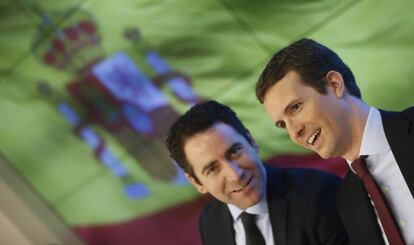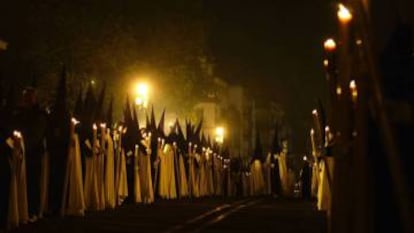Spain’s conservatives accuse PM of disrespecting Easter over snap election date
Popular Party makes a political issue out of religious traditions as it vies with far-right Vox for votes on April 28

Officials at Spain’s conservative Popular Party (PP) are criticizing the prime minister’s choice of date for the snap general election, saying it shows little sensitivity for religious observance.
Teodoro García Egea, the PP’s secretary general, said that PM Pedro Sánchez’s decision to call an election for April 28 is “disrespectful” because the first week of campaigning will coincide with Easter celebrations.
Sánchez doesn’t care about this country’s traditions
José Antonio Monago, ex-premier of Extremadura
“I can proudly say that this year I am the pregonero [person who makes the opening speech] at the Easter celebrations in Murcia,” he said. “And rather than see city lampposts draped with politicians’ faces, I would prefer to see them covered with the symbols of religious brotherhoods and to celebrate the Friday of Sorrows the way God meant it to be celebrated.”
Speaking in Madrid on Monday at a political debate group called Europe Forum (Fórum Europa), the PP’s number two official said that Sánchez, of the Socialist Party (PSOE), “thought we would put the campaign ahead of our traditions, but he was wrong. We are going to uphold our traditions, to celebrate Easter week the way it should, and to give [Sánchez] what he deserves. He’s got two months left.”
Sánchez announced the snap election last Friday, shortly after failing to secure congressional support for his 2019 budget plan. The PSOE leader has been at the helm of a fragile minority government since early June, after spearheading a successful no-confidence vote against Mariano Rajoy of the PP. During these eight months in power, Sánchez has struggled to get legislation passed and has relied largely on government decrees to push his governing program through.

The matter was also discussed on Monday at a lunch that PP president Pablo Casado held with regional party leaders following a meeting of the national executive committee. The majority opinion was that PP officials could not allow themselves to be absent from the major Easter processions.
“Sánchez doesn’t care about this country’s traditions,” said José Antonio Monago, the former regional premier of Extremadura. Fernando Martínez-Maillo, a former PP coordinator general, said that Easter is the most important week in his home province, Zamora, and that holding political rallies next to religious processions would make them look “like extraterrestrials.”
The role of tradition
Tradition is becoming an increasingly relevant issue at a time when Vox, an emerging far-right party that is taking voters away from the PP, is treating the defense of bullfighting and hunting as matters of national importance.
When Vox agreed to support the PP’s Juan Manuel Moreno as the new premier of Andalusia following the December election there, it was only after reaching a deal where both parties pledged to “promote Easter celebrations.”
I would rather see lampposts covered with symbols of religious brotherhoods than with politicians’ faces
Teodoro García Egea, PP secretary general
PP president Pablo Casado, who promised a shift to the right when he was elected to the post at party primaries last July, has already announced that if he becomes prime minister of Spain, the first two things that he will do is to lower taxes and to newly suspend the Catalan government’s powers of self-rule, this time “for a duration of time that others did not want back in 2017.”
The previous Spanish PM, Mariano Rajoy of the PP, invoked a constitutional provision in late October 2017 to temporarily suspend Catalan self-rule, shortly after separatist parties made a unilateral independence declaration inside the regional parliament. These powers were restored seven months later, after Catalonia held an election and appointed a new government.
Casado said that if the PP does not stand firm against separatists, the pro-independence movement could extend to the Balearic Islands, the Valencia region and Aragón, regions with historical and in some cases linguistic ties to Catalonia.
The PP leader described April 28 and May 26 – when Spaniards will vote in local, regional and European elections – as “two days within the same elections,” and compared today’s situation with Spain as it emerged from a dictatorship in the late 1970s: “Forty years later, they are forcing us to choose between confrontation and concord.”
English version by Susana Urra.
Tu suscripción se está usando en otro dispositivo
¿Quieres añadir otro usuario a tu suscripción?
Si continúas leyendo en este dispositivo, no se podrá leer en el otro.
FlechaTu suscripción se está usando en otro dispositivo y solo puedes acceder a EL PAÍS desde un dispositivo a la vez.
Si quieres compartir tu cuenta, cambia tu suscripción a la modalidad Premium, así podrás añadir otro usuario. Cada uno accederá con su propia cuenta de email, lo que os permitirá personalizar vuestra experiencia en EL PAÍS.
¿Tienes una suscripción de empresa? Accede aquí para contratar más cuentas.
En el caso de no saber quién está usando tu cuenta, te recomendamos cambiar tu contraseña aquí.
Si decides continuar compartiendo tu cuenta, este mensaje se mostrará en tu dispositivo y en el de la otra persona que está usando tu cuenta de forma indefinida, afectando a tu experiencia de lectura. Puedes consultar aquí los términos y condiciones de la suscripción digital.








































